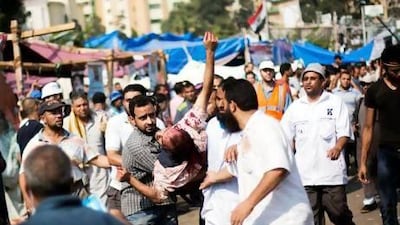CAIRO // A 48-hour military ultimatum for the Muslim Brotherhood to withdraw from the streets and join the political process expired last night, raising the prospect of a sweeping security crackdown in a country already racked with bloodshed.
The deadline expired on a day when dozens of pro-Morsi protesters were killed in the early morning hours near the Rabaa El Adaweya square in Cairo.
The health ministry said 65 people were killed and more than 250 injured injured, but the Muslim Brotherhood claimed more than 100 of its supporters had been killed.
It was the single deadliest incident since Hosni Mubarak was forced to resign in 2011 amid a popular uprising that featured many incidents of police using deadly force against anti-government protesters.
Mohamed ElBaradei, the interim vice president for foreign relations, strongly condemned the "excessive use of force" in the latest clashes, and said he was "working hard and in every direction to end the confrontation in a peaceful way".
One of the main battle scenes in Cairo yesterday was near Egypt's "Tomb of the Unknown Soldier", a pyramid-shaped monument built by the former president Anwar Sadat to honour soldiers in the 1973 war with Israel.
Pro-Morsi protesters threw rocks at police and tried to block the nearby 6th of October Bridge in the early hours of yesterday.
A spokesman for the interior ministry, Hani Abdel Latif, said the clashes began when protesters blocked traffic and "clashed with residents of the nearby Mansheyet Nasr district using live fire and birdshot".
"The police moved to stop the clashes between the two groups and opened the road again," he said.
A security official denied accusations that the police used live ammunition.
The health ministry said nine people had also died in clashes in Alexandria since Friday, and nearly 750 were wounded in violence nationwide.
The deaths, after the deputy prime minister and defence minister Gen Abdel Fattah El Sisi called on Egyptians to take to the streets to give him a "mandate" to combat "terrorism", are expected to dramatically raise tensions in Egypt. Many believed the army would declare a state of emergency, giving it greater powers to arrest citizens.
Hundreds of thousands of Egyptians heeded Gen El Sisi's call, filling squares across the country and displaying fiercely pro-military sentiments. Many supporters of the military's removal of Mr Morsi from power after one year in office believe the Muslim Brotherhood was connected to several bombings and attacks on military installations in the past month.
The Brotherhood have denied any connection to the violence, casting themselves as the victims of a military dictatorship bent on eliminating them from the political landscape because they refuse to accept the new government.
Using the blood of a victim of Saturday's clashes, someone wrote "Sisi is a traitor" near a mosque serving as a field hospital and morgue for the wounded and dead.
Mr Morsi, detained by the military "for his own safety" since his removal on July 3, might be moved from the unrevealed location where is being held to the Tora Prison, the interior ministry spokesman said.
Former president Mubarak is being held at the same prison.
Mr Morsi was accused by an investigating judge on Friday of conspiring with the militant Palestinian group Hamas to break out of prison during the 2011 uprising. The charges included Mr Morsi's involvement in attacks on security buildings, breaking free from prison, murder and abduction.
The charges meant Mr Morsi could face the death penalty, a greater punishment than Mubarak is facing on charges of failing to use his powers to stop the killing of protesters in 2011. Mubarak was sentenced this year to life in prison in his criminal case, but the ruling was overturned by an appeals court because of procedural errors. However, he cannot receive a heavier sentence than in the first case, according to Egyptian law.
There were also signs yesterday of the military exerting greater control over state media. The country's flagship newspaper, Al Ahram, focused coverage on the large pro-military protests on Friday rather than the killings yesterday morning. State television channels featured segments on the improvement of the economy, ignoring scenes of carnage in field hospitals filled with hundreds of injured pro-Morsi protesters.
The Muslim Brotherhood has called yesterday's shooting a second "massacre" against its ranks in less than three weeks. On July 8, 51 pro-Morsi protesters and two security officers were killed during an early-morning battle. That event was hotly contested by the two sides, with the army maintaining that it was forced to use live ammunition after militants attacked an army barracks and the Brotherhood claiming its supporters were attacked without warning by the police and army.
The military has embarked on a campaign to undermine the former president's supporters over the past month, issuing videos of protesters firing guns at security officers and suggesting that the Brotherhood was exaggerating the number of its supporters who were killed. Col Ahmed Ali, the army spokesman, has given numerous interviews explaining how the military acted against Mr Morsi only after he refused to respond to millions of demonstrators calling for early presidential elections.
* With reporting by Agence France-Presse and Associated Press

